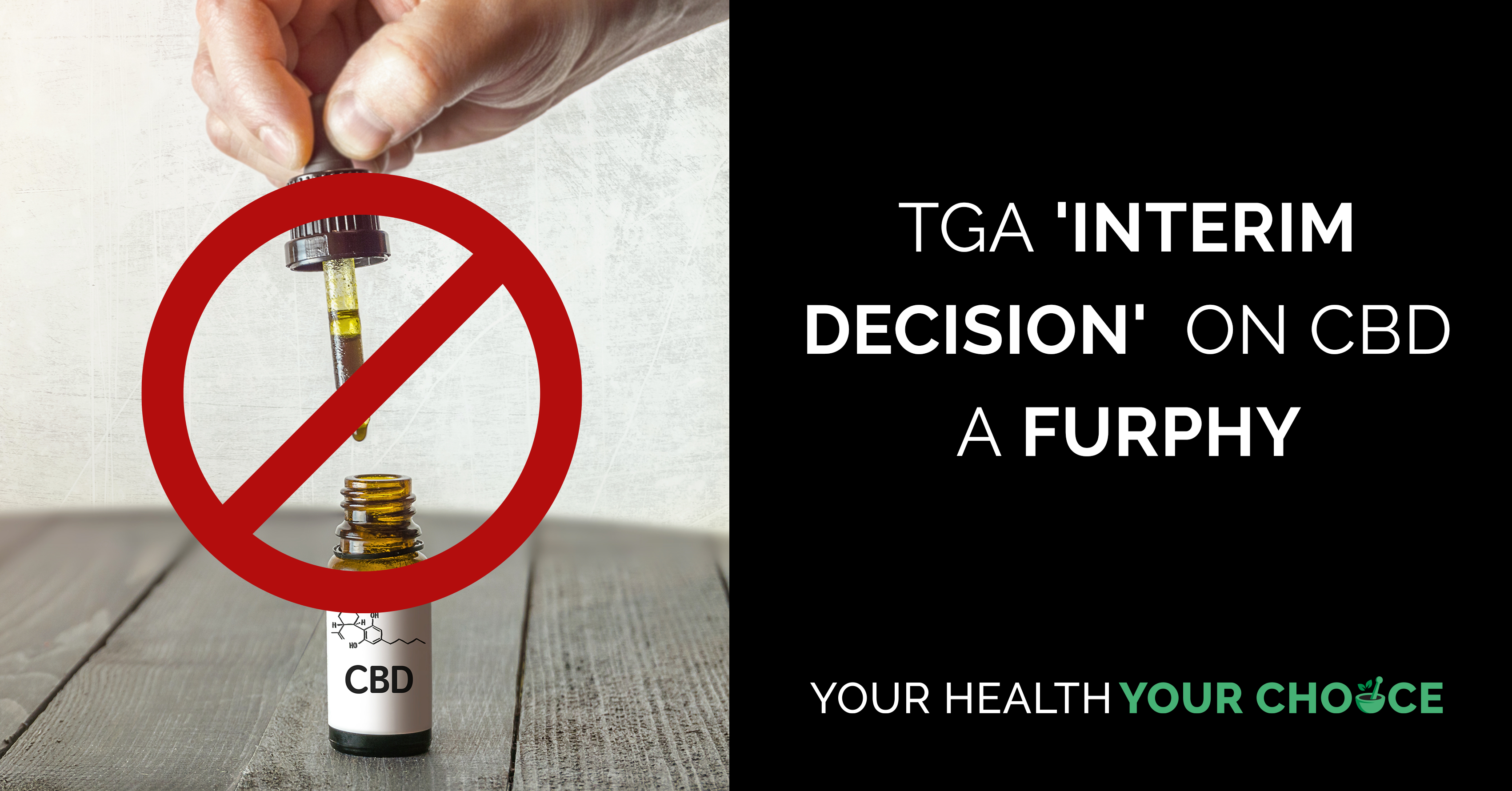TGA ‘interim decision’ on CBD sidelines public feedback and proposes a furphy

Australia’s medicines regulator, the Therapeutic Goods Administration (TGA) has ignored public feedback and is set to implement measures that will ensure that access to cannabidiol (CBD) will remain restricted and expensive – while making the public think otherwise.
On 9 September 2020, the TGA released its “interim decision” on future access to CBD, backing its own option to ‘down-schedule’ CBD so products are able to be accessed from a pharmacist without a prescription.
In doing so, it has ignored over 95% of feedback from the public, patients and health experts opposing this proposal in favour of other options that would make CBD products more easily available and affordable – as in many other countries.
The TGA has also further amended its original proposal, making it even more restrictive than the version it consulted the public on.
On the surface, the TGA announcement sounds like a big step forward and a major win for the patients and the public. But beneath the surface, things aren’t what they seem.
‘Claytons’ proposal – the illusion of access you won’t have
Under the TGA proposal, CBD can only be accessed through a pharmacist under a set of strict conditions that mean current access and affordability restrictions will not change – not for a very long time, if ever.
These conditions are:
- CBD be limited to no more than 60 mg/day in oral dosage forms;
- The quantity supply be limited to a 30-day supply;
- Supply be restricted only to CBD products that have been entered in the Australian Register of Therapeutic Goods (ARTG) – the TGA’s medicines register.
How does this play out in practice?
1. Approved dose (60mg) too low to be therapeutically beneficial:
There is a paucity of sufficient data that the 60mg/day dose permitted by the TGA interim decision is therapeutically beneficial, which the TGA would be well aware of.
The TGA has approved 60mg/day because it is “safe” – not because it is clinically effective/ beneficial.
New research published in the International Journal of Drug Policy supports scientific consensus that 60mg per day is unlikely to be beneficial to patients.
According to the paper’s co-author, Professor Iain McGregor, academic director of Sydney University’s Lambert Initiative for Cannabinoid Therapeutics, there is “very good evidence” in scientific research that 300 to 400mg of cannabidiol was effective at treating anxiety and “reasonable” evidence that this dose could effectively treat insomnia and chronic pain. This is 5-6 times higher than the dose TGA has approved.
Prof McGregor says much higher doses were needed to give relief to patients with chronic pain, insomnia, anxiety and epilepsy and in relation to the TGA proposal says,
“There is no good quality evidence that 60mg does anything useful”
2. 30-day supply limit
Because quantity of supply is limited to 30 days and the 60mg/day dose is too low to be effective, many people accessing TGA-approved CBD products via a pharmacist (if they are ever approved) would attempt to take several doses at a time to get any relief.
This means their supply would run out in a week – defeating the purpose of the exercise.
3. Supply restricted to products on ARTG, which would remain expensive
For a pharmacist to sell CBD products, these products must first be ‘registered’ with the TGA and meet criteria that are almost impossible to achieve.
A CBD product must be ‘clinically proven’ to work for a health claim at the low 60mg/day dose, which is extremely hard to do. To meet the TGA’s registration requirements, large and costly clinical studies would need to be run, which is not feasible.
Since the evidence indicates that a 60mg/day dose is sub-therapeutic, no company is likely to invest millions to trial a product that is unlikely to work.
This means no products will be approved for many years, if ever, so that CBD products will not actually be available through a pharmacist.
And even if any products were, the high cost of conducting trials would mean products would remain prohibitively expensive and out of reach of the people it is supposed to help.
The TGA is effectively only allowing high-cost, ineffective doses for supply to consumers – defeating the purpose and dishonouring the recommendations of the 2019/20 Senate inquiry into barriers to patient access to medicinal cannabis in Australia to make affordable CBD products more easily accessible to Australians.
TGA amends its proposal to be even more restrictive
On top of this, the TGA has also further amended its proposal to ‘plug loopholes’, making potential access to CBD through a pharmacist even more prohibitive – further negating any benefit that down-scheduling was intended to achieve.
These amendments mean that pharmacists will be prohibited from 1) compounding CBD as a Schedule 3 medicine, or 2) from providing patients with CBD products that are not registered on the ARTG.
Currently, medical practitioners can provide patients with CBD subject to approval under the TGA’s Authorised Prescriber Scheme or Special Access Scheme.
The TGA has now revised its proposal to ensure that pharmacists are barred from offering patients CBD via these routes – effectively not trusting their ability to make “informed decisions” on CBD products that are not registered on the ARTG.
Unfounded ‘safety’ concerns:
The TGA has imposed strict measures on supply (60 mg/day dosing, not more than 30 days supply, adult use only, inclusion of mandatory warning statements and supply in child-resistant packaging) for the purpose of addressing any perceived safety concerns – which by its own assessment should be more than adequate to ease access restrictions.
The TGA’s decision to not allow CBD for general sale was based on reasons such as potentially mild adverse reactions, like somnolence (drowsiness) and decreased appetite.
Yet this ignores the fact that there are many over-the-counter products available that have far more serious side effects than CBD, and which are dealt with by labeling. Why is CBD, which is safer, treated differently?
The other reason cited by TGA is ‘potential interaction with other drugs’.
This ignores the fact that the evidence, and the TGA’s own safety report on CBD, shows that this is “uncertain and unconfirmed” at the very low doses proposed. Overseas experience does not support this concern.
A setback for Australian industry
The requirement that all products need to first be registered on the ARTG is also detrimental to the still-developing Australian medicinal cannabis industry.
Meanwhile, Australia exports medicinal cannabis products to other countries where products such CBD can be bought in stores and online – without any safety concerns.
According to medicinal cannabis campaigner Lucy Haslam,
“The government is talking big on being able to export to the world, saying Australia wants to be the biggest exporter of medical cannabis in the world and gloating about that, yet our own patients can’t access it.”
TGA proposal ensures CBD will remain unattainable & unaffordable into the future
What all this means is that the TGA has not actually made CBD products any more accessible or affordable and patients are likely to continue to “self medicate” instead.
According to Prof McGregor, whether people smoked cannabis or bought CBD products on the black market, “these people may just bypass the medical profession.”
He estimates that while around 10,000 Australians adults were accessing the CBD through the TGA’s special access scheme, an estimated 600,000 (>98%) “may be self-medicating a medical condition with cannabis.”
Meanwhile, people in comparable overseas countries (including the UK, many European countries, South Africa, Canada and several US states) continue to easily and safely access affordable CBD, while Australian patients continue to be criminalised for seeking relief from their suffering.
TGA seeking further public feedback by 13 October:
The TGA is asking for further feedback on its “interim decision” by 13 October. https://consultations.health.gov.au/…/copy-of-copy-of-copy…/
We will keep you posted.
« Return to News & Features
